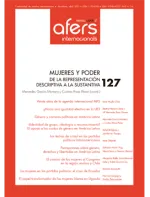Does being a female member of parliament make a difference? Perceptions of gender, rights and freedoms in Latin America

Salvador Martí i Puig, catedrático de Ciencia Política, Universitat de Girona (salvador.marti@udg.edu), ORCID: https://orcid.org/0000-0002-4464-4452
Macià Serra, investigador y profesor de Ciencia Política, Universitat de Girona (macia.serra@udg.edu), ORCID: https://orcid.org/0000-0003-4158-042X
Gemma Ubasart-González, profesora de Ciencia Política, Universitat de Girona (gemma.ubasart@udg.edu), ORCID: https://orcid.org/0000-0002-2957-0766
The paper explores the perceptions of the parliamentary elites in 17 Latin American countries on moral and gender issues through surveys conducted between 2012 and 2019. In particular, it analyses opinions on inequality between men and women, public policies to reduce it, the possibility of building a career within the party, and abortion and same-sex marriage. The analysis shows the differences between countries and whether gender, party ideology and age variables help explain the answers. The findings suggest that in many countries gender is a factor in explaining the differing opinions on the inequality between men and women and, to a lesser extent, same-sex marriage. The data also lead us to believe that ideology is the variable that influences the perception of the other three issues. The conclusions reflect on programmatic and descriptive representation for each topic and country.
Keywords: Latin America, political elites, political attitudes, gender inequality, abortion, equal marriage
How to cite this article: Martí i Puig, Salvador; Serra, Macià y Ubasart-González, Gemma. «¿Hace la diferencia ser diputada? Percepciones sobre género, derechos y libertades en América Latina». Revista CIDOB d’Afers Internacionals, n.º 127 (abril de 2021), p. 147-172. DOI: https://doi.org/10.24241/rcai.2021.127.1.147
>> The full text articles of this issue are available only in Spanish language